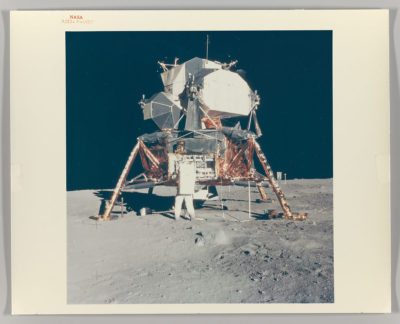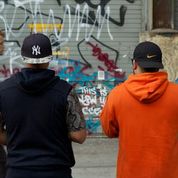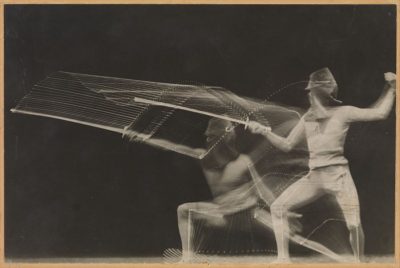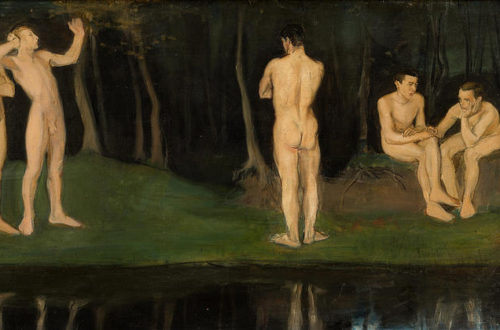
“The Tracks” by Felicity LuHill
Kim stared at her feet and silently counted her steps. One, two, three… 267 steps between lampposts. One hundred and fifty steps between mailboxes. Forty-two steps since the last time she passed a dog—a small, beige terrier, unafraid to yap at sulky teenage girls. She counted to remind herself that she was another step closer to her bedroom—to cool pillows, beef jerky, and documentaries about ships discovered on the bottom of the ocean.
She wondered what she would say to Stella, her mother, when she got home. “How can you forget to pick up your own daughter?” was an effective sentiment Kim frequently used. “Are you seriously drinking right now?” seemed a bit too harsh. “Drinking,” of course, could be substituted with whatever Stella was actually doing when she neglected to pick her up from school at 3:15 on a Tuesday: scraping a scratcher with a rusted penny, watching Jeopardy, smoking the butt of a cigarette… or, more likely, a poised display of all of the above. Kim contemplated saying nothing when she got home, walking into the kitchen, grabbing the jerky, and going upstairs, leaving her mother confused into guilt. Unfortunately, silence never seemed to be as satisfying in practice as it was in theory. People tended not to care unless you forced them to.
There was the small possibility that her mother would not be home. Perhaps she really did have something to do. Kim fantasized about legitimate excuses that made Stella look like a decent mother: she got into a car accident on the way to picking her up and had to go to the hospital. She couldn’t answer her phone because she went into emergency surgery. She didn’t text or call before the surgery because she was unconscious. Kim would discover the accident later that evening when her mother finally did call, and she would feel inexcusably guilty for thinking Stella a bad mother. Kim reveled at the thought of her mother’s legitimizing ailments, at the prospect of her own ironic guilt.
But Kim knew that none of this had happened. Her mother didn’t pick her up because she forgot. She had no other excuse. She got distracted by intoxicants, carried away staring off into space, caught up in yelling at the delivery guy for bringing their TV Guide a few hours later than she had expected.
Kim wondered if Stella would’ve noticed if she got into some kind of accident, how long it would take for Stella to call, how much time before she felt guilty. She put the thought out of her mind, afraid that it would take days for Stella to realize something was different.
A couple years ago, when Kim had just turned thirteen, she ran away. Every aspect of her life had become exhausting. She was frustrated with Stella’s latest choice in boyfriend, resentful that her teachers thought she needed to see the school counselor, moody over her general lack of clique. A weekend of sleeping on a bus and eating vending machine food went by before Kim realized that she didn’t have enough money to make it and needed to come home. When she finally did, Stella looked vaguely confused and acted as if nothing new had transpired. She inquired with interest, “How was the sleepover? Did you get a chance to pick up some toilet paper on the way home?” Stella didn’t understand that Kim had no friends whose houses she could sleep over—nor could she fathom that extra toilet paper was stored under the sink.
Kim’s sigh got caught in her chest as she trudged on. Her backpack felt heavier with every step and she lamented that today was one of the days she had to bring home her clarinet—a deceptively heavy instrument whose case bumped against her right knee every few seconds. She counted those, too.
She examined the houses she passed and hated that she recognized them so well: a particularly boxy brown house surrounded by bright green turf marked that she was about thirty percent home; a creepy white house with overgrown bushes and an open front door marked forty percent; somewhere in between was a provincial yellow house where an older woman gardening once struck up a conversation with Kim. The gardener had given her a sprig of rosemary, and inquired if her mother cooked. Kim had told her that she did because she didn’t want to disappoint. The woman told Kim that she was pretty, and insisted that she must be smart for no reason other than the size of her backpack. Kim thanked her and said that she needed to get home before her mother started to worry. As she had started to walk away, the gardener mentioned off-hand that the rosemary could also be burned like incense, and when Kim got home she took the rosemary and Stella’s lighter back up to her bedroom to give it a try.
She soon approached the elevated train tracks, which meant she was halfway there. The tracks were a beacon of hope and a cliché barrier between the nicer neighborhood she was now walking through, and the beaten-down, unafraid-of-loud-bass neighborhood she was headed toward.
The tracks sat on a long, level mound of dirt, perpendicular to the road she walked on now. To cross them, she needed to walk several blocks out of the way to access the nearest underpass. She sometimes contemplated climbing the hill and crossing the tracks illegally to shorten her walk, but if Stella couldn’t pick her up at the same time from the same place on a day-to-day basis, how could she expect her to manage an impromptu pick up at a police station?
She watched the sky change color over the tracks’ modest hill, like an artificial sunset in a film studio attempting to depict a bigger, grander sunset. Though she knew the sun was starting to go down early now because it was late fall, she felt hopelessly like she was taking too long to walk home.
This is what Kim was thinking about when she saw it: the silhouette of a person standing on the tracks. Several seconds passed and she realized the person was not moving. She tried to trick herself into believing it was some kind of tall railway equipment. But as she got closer she could see that it was undeniably a person—a boy, to be exact, approximately her age.
She looked around to see if anyone else was there to notice, but the streets were eerily empty. She stopped walking and hesitated for a moment. Then she set down her clarinet case and slid off her backpack. Without giving it another thought, she started running toward the tracks.
* * *
Will’s options were limited. He didn’t own a gun or know anyone who owned a gun. He didn’t have prescription drugs and he didn’t think his placid grandfather’s extensive set of multivitamins would work. He thought about knives, but he wasn’t sure how to most efficiently go about a knife for this purpose. He was also concerned someone might suspect homicide. With the train, there would be no culpability but his own… and perhaps the flimsy fencing along the edge of the tracks’ dirt mound. That may be fixed after he’s gone.
He didn’t leave a note because he hoped someone might think it was an accident. Perhaps he just wanted to efficiently cross the tracks. That would make things easier on his grandfather. People who did suspect otherwise would inevitably point to various, irrelevant reasons: parents died at a young age, performed poorly at school, drug problems. He didn’t have drug problems, but some meddlesome mother would blame drugs while discussing the latest local tragedy with her kids. People couldn’t cope unless things had an obvious, logical sequence: glaciers melt to create rivers that flow into lakes, the water of which we exploit for drinking and recreational use.
But things frequently didn’t make sense. Because glaciers were melting too quickly, and water was expanding from the heat, and cities were flooding. So people were trying new ways of desalinization that required energy… energy from the same sources that initially caused the glaciers to melt and the water to expand.
But why was the pursuit of continuing the human race so important anyway? Humans are a species of water and memories that came about the last few minutes of the universe’s history. They’ve done nothing but destroy for personal gain…. And when humans destroy for personal gain they don’t think about how they would be nothing if it weren’t for the earth’s atmosphere. How every other planet is seemingly lifeless… though perhaps maintain a form of life humans’ self-centered minds couldn’t understand….
And aside from that people didn’t think about how they’re all just composed of atoms that have arbitrarily decided to stay in a solid form long enough for people to believe that the world makes sense, to trust that walls divide and protect, that there aren’t an infinite number of possible outcomes for any situation…. People didn’t think about that. People weren’t supposed to think about that.
Will’s family and friends were concerned about his questions on why the human race mattered. His cousins laughed when he pointed out that the sun will die someday and when he concluded in earnest: it’s pointless for people to campaign or fight over religion. There should be a religion that explains black holes and gravity.
It went both ways. Will didn’t understand the people that didn’t understand him. He didn’t get why people watched movies or cared about sports. Everything was fleeting and superfluous. Why would Todd buy a hamster? Why would Uncle Ricky fall in love?
This was his perspective as he looked for the oncoming train. This made sense as a cold breeze gave him goose bumps. He was weary from solitude. He wanted rest.
But his inescapable ostracism and the questions that caused it wasn’t really why Will was standing on the tracks. Will exploited his unique way of thinking to justify his infinite source of anxiety. He decided a long time ago that the way his mind worked was directly related to the constant ache that weighed on his throat and lungs. He resolved that somewhere inside him, likely between his head and his chest, was the meeting point of his intellectual crimes against social norms and his insatiable homesickness.
He insisted that one caused the other, like the glaciers that ran into lakes, and yet he felt that probably wasn’t true. Because his thoughts and his feelings felt in constant battle with each other, yet parallel and untouching. He would tell himself pragmatically that though nothing made sense, he was inherently OK, and yet somehow he felt that wasn’t true. He was tired but couldn’t sleep. He was unconditionally sad. He never had a decent explanation for his red, chapped cheeks.
Wind whipped his t-shirt against his torso. His stomach turned, and for a moment he was comforted knowing that soon it no longer would. He closed his eyes and tried to feel for vibrations in the tracks.
Thump.
His pulse spiked and he began to breathe heavily. For a moment he thought the train had hit him and he was still alive. But he was still standing, and the force came from his side instead of in front. When he opened his eyes he found a girl’s arms wrapped around him. She was holding him tightly and gasping for breath.
“Don’t do it!” she yelled.
Will frowned at her, “You don’t need to yell, I’m right here.” The girl had curly hair and smelled like honey and artificial flowers.
“Don’t do it,” her voice cracked and her eyes started to water, but her expression was unflinchingly determined, like she knew exactly what she was doing.
“Who are you?”
“If you do this, you’re taking me with you.”
Will couldn’t help but judge this girl for being melodramatic. He looked at his watch, the train was supposed to arrive in a few minutes.
“Look, can you get off of me?”
“I told you! If you do this, I’m going with you!” She held him tighter.
He tried pushing her off of him, but he could barely get his arms out from under her grip. He shoved her as hard as he could, but if he wanted to use his weight and momentum he would have to step off the tracks.
“I don’t even… know you!” he said, as he tried pushing her away, “This isn’t… fair!” He was truly struck by the injustice of the situation. This strange person had just decided that he was going to kill her against his will. He briefly wondered if this kind of death would be considered second degree murder or manslaughter. His watch started to beep: he had two minutes.
“Look, can you just… get… off!” he tried twisting his body away from her but it wasn’t working, her legs were lunged in such a way that she maintained balance. She was short but noticeably stronger than him. He could feel her flexed biceps against his back and ribcage. His efforts felt awkward and silly. He was annoyed that she managed to take the grace out of his death.
“You matter, ok?” she said, two tears escaped her eyes and travelled down the length of her face. Her composure was gone. “I know it may not seem like it right now, but you do! People are paying attention to you. I’m paying attention to you!”
He saw the concern in her face, her true distress. He had no idea what she was talking about, this had nothing to do with who or who wasn’t paying attention to him. Somehow he got the feeling she wasn’t talking to him at all. He couldn’t help but think this was exactly the kind of behavior he didn’t understand. Why did she care so much, a perfect stranger?
Now he could see the train coming from a distance, a minuscule speck. It was an express train traveling eighty miles an hour, just over a minute away.
Then her behavior became even less comprehensible: she grabbed the back of his neck and brought her lips to his. But what he found most surprising of all: he let her do it.
* * *
Kim didn’t have an explanation for why she was risking her life for this boy. All she could think as she jumped the fence and climbed the hill was that she was certain his life couldn’t be more dispensable than hers. Somewhere along the way her own selfish motive for someone to notice her came up as well.
She also didn’t have an explanation for why she kissed him, except her intense desire for him to know that someone cared. She knew that’s all she wanted in the world, and she suspected that’s all he wanted, too.
He had begun to wrap his arms around her when the train blew its horn. They broke the kiss. He pulled her off the tracks, rolling onto their sides. They got off unsteadily and continued to roll down the hill. The train roared by. It was loud and massive. She felt she could hear every gear inside shift to push it forward. The horn continued to blow, screaming at her, scorning her for what she had done, reminding her that she was afraid of death. She lay at the bottom of the mound looking up at the pinkish sky, her heart racing, the immensity of what just happened beginning to sink in.
The final car of the train soon passed and ringing silence took over. The boy lay close to her, also looking at the sky. They did nothing but breathe for several moments. She wondered if she made a mistake thrusting herself into his life. Perhaps there was another way she could’ve helped him.
She turned her head and watched him: his eyes blinked, his stomach rose and fell, his hands trembled… all because of her. She just prevented death. She saved someone’s life and, by some power of reflexivity, he saved hers. She knew now that if she had tried to do anything else it would’ve been too late.
She looked back up at the sky and let minutes pass. The twilight canvas above them rippled orange, red and purple. A few stars were coming into view. Wind from the train had whipped up dirt and leaves, making the air feel fresh and alive. For a moment she thought she smelled rosemary.
* * *
Will was embarrassed. That’s the only word he could find to describe how he felt in that moment. He somehow made himself vulnerable to this person and showed her how selfish he could be. Letting her get that close to death was selfish. Choosing to end his life in the first place was selfish.
For a moment, he pictured his grandfather trying to solve one of his thousand-piece puzzles without Will’s help, undoubtedly failing. Will pushed the thought out of his mind. He knew that he had the right to choose if he wanted to live. He hated that this girl made him feel this way. She would never understand why he needed to do this. He contemplated trying again some other day, on a different section of the tracks.
He was warm, sweating in his flimsy t-shirt, and he could feel blood pumping in his neck. His knuckles felt tingly and he couldn’t quiet his heavy breathing. He wondered if these signs of adrenaline were in part due to the kiss. In the seconds it transpired he felt happy, hopeful, and calm. He tried to recall the last time he felt any of those things.
“You know what’s weird?” She interrupted his thoughts. Her voice was conversational now.
“What?” He replied. He felt very aware of how close she was to him, a mere couple of feet that could be crossed with a limb.
“People think sunsets are so pretty, but, in reality, pretty sunsets are just light waves reflecting off of particles caused by pollution…. So really when people get excited and emotional about sunsets, they’re getting excited and emotional about air pollution.”
“I knew that,” Will replied, “You’re right. It is weird.” He examined the sky more closely; he wasn’t paying attention to it until now. Just as he began to feel a familiar, unexplainable wave of anxiety sink in, she reached for his hand. It was warm and soft and he clasped it because he wanted to.
*
Felicity LuHill is currently the Digital Publishing Assistant at the University of Chicago Press. A recent graduate of The New School Creative Writing MFA program, her work has been published in Brooklyn Magazine, The Inquisitive Eater, and Enchantress Magazine. In 2019, her screenplay, Losing It, was a finalist for Voice Over. Her writing can also be seen with Barbershop Books and Healthy Materials Lab. You can find her on Twitter @charmingfelic
© LIT Magazine Issue #33, 2019




